



ORGANS OF PARIS © 2026 Vincent Hildebrandt HOME ALL ORGANS
Versailles, Cathédrale
Saint Louis
4 place Saint Louis, 78000 VersaillesOrgue de choeur OdT>
1880 - Aristid Cavaillé-Coll
1911 - Charles Mutin
1940/47 -Jules Bossier
1978 - Adrien Maciet
2001 - Gildas Ménoret
II/14 (15) - transmissions mécaniques
stoplist
I : Grand-Orgue (56 notes) Bourdon 16' Montre 8' Flûte Harmonique 8' Bourdon 8' Prestant 4' Doublette 2' Plein-Jeu III rgs II : Récit expressif (56 notes) Flûte douce 8' Salicional 8' Voix Céleste 8' Flûte octaviante 4' Basson 16' Trompette 8' Basson-Hautbois 8’ Pédale (30 notes) Soubasse 16’ (emprunt du GO) 14 jeux - 2 claviers manuels de 56 notes et pédalier 30 notes Transmission mécanique des claviers et des jeux • Accouplements : II/I ( 8,16') • Tirasses : I/P - II/P • Appel + renvoi d'anches (du Récit) : l'astucieux mécanisme permet toujours par la rotation des tirants de pré-sélectionner les jeux correspondants. • Appel Mixture GO • Appel trémolo général • Expression Récit par cuiller Le jeu de Soubasse n'a toujours pas de tirant, l'appel et le renvoi se font par une cuillère Videos Christian Ott photos: Vincent Hildebrandt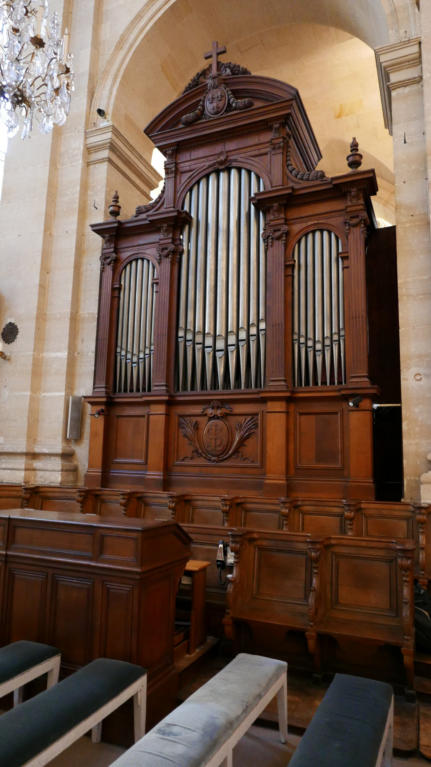
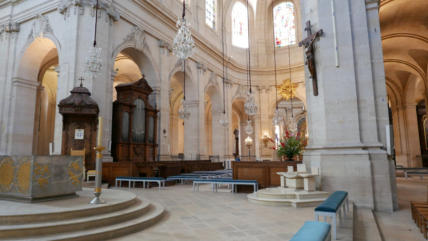
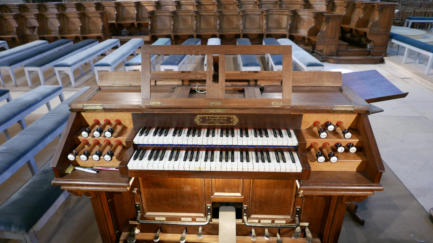
The old chancel organ of the cathedral was built in 1837
by the organbuilder John Abbey, established in Versailles
(rue de la Chancellerie, near the cathedral and the
castle). It was then composed of 9 stops: six on the
Grand'Orgue: Flûte, Bourdon, Prestant, Doublette, Plein
Jeu, Trompette and three on the Récit: Flûte Ouverte,
Prestant, Hautbois. In 1863, the instrument was restored
by Cavaillé-Coll. It was transferred in 1883 to the new
cathedral of Tunis and then replaced in 1923 by a large
Mutin organ and has probably disappeared. Read more...
In 1880, a new organ was built by Aristide Cavaillé-Coll,
which replaced the organ of John Abbey.
In 1911, Charles Mutin made changes.
In 1940 and 1947: two interventions by organbuilder
Bossier in the neo-classical style, adding mutations to the
GO (nazard and tierce) and placing the Plein Jeu in the
Récit on a posted windchest.
In 1978, Adrien Maciet made a total readjustment of the
mechanism, changed the bench that had become too
narrow and installed a new 30-note pedalboard.
In 2001, a restoration by Gildas Ménoret of Nantes:
return to the Cavaillé-Coll organ (removal of the
mutations of the GO, restitution of the romantic Plein-Jeu
to the GO).
Source
Organs of Paris
Versailles,
Cathédrale
Saint Louis
4 place Saint Louis, 78000 VersaillesOrgue de choeur OdT>
1880 - Aristid Cavaillé-Coll
1911 - Charles Mutin
1940/47 -Jules Bossier
1978 - Adrien Maciet
2001 - Gildas Ménoret
II/14 (15) - transmissions mécaniques
stoplist
I : Grand-Orgue (56 notes) Bourdon 16' Montre 8' Flûte Harmonique 8' Bourdon 8' Prestant 4' Doublette 2' Plein-Jeu III rgs II : Récit expressif (56 notes) Flûte douce 8' Salicional 8' Voix Céleste 8' Flûte octaviante 4' Basson 16' Trompette 8' Basson-Hautbois 8’ Pédale (30 notes) Soubasse 16’ (emprunt du GO) 14 jeux - 2 claviers manuels de 56 notes et pédalier 30 notes Transmission mécanique des claviers et des jeux • Accouplements : II/I ( 8,16') • Tirasses : I/P - II/P • Appel + renvoi d'anches (du Récit) : l'astucieux mécanisme permet toujours par la rotation des tirants de pré-sélectionner les jeux correspondants. • Appel Mixture GO • Appel trémolo général • Expression Récit par cuiller Le jeu de Soubasse n'a toujours pas de tirant, l'appel et le renvoi se font par une cuillère Videos Christian Ott photos: Vincent Hildebrandt
ORGANS OF PARIS © 2026 Vincent Hildebrandt ALL ORGANS
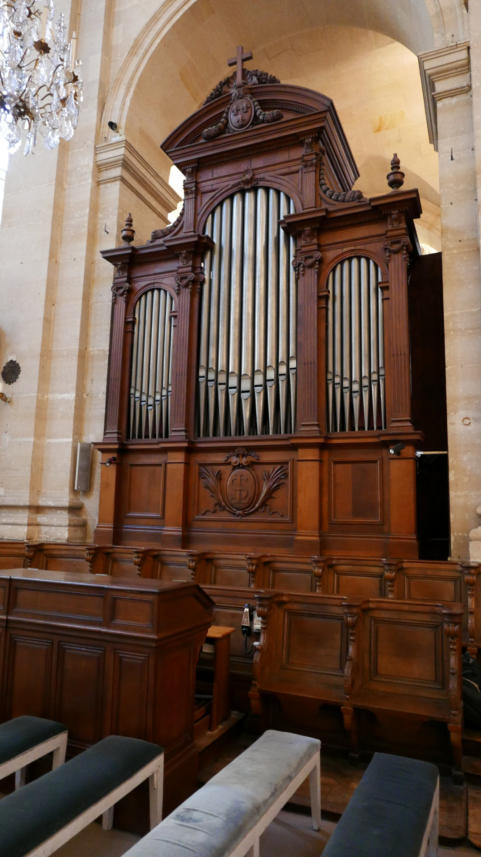
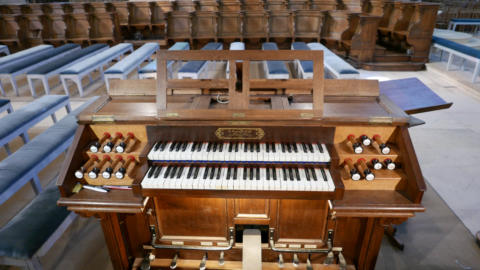
The old chancel organ of the cathedral was built in 1837 by
the organbuilder John Abbey, established in Versailles (rue de
la Chancellerie, near the cathedral and the castle). It was then
composed of 9 stops: six on the Grand'Orgue: Flûte, Bourdon,
Prestant, Doublette, Plein Jeu, Trompette and three on the
Récit: Flûte Ouverte, Prestant, Hautbois. In 1863, the
instrument was restored by Cavaillé-Coll. It was transferred in
1883 to the new cathedral of Tunis and then replaced in 1923
by a large Mutin organ and has probably disappeared. Read
more...
In 1880, a new organ was built by Aristide Cavaillé-Coll, which
replaced the organ of John Abbey.
In 1911, Charles Mutin made changes.
In 1940 and 1947: two interventions by organbuilder Bossier
in the neo-classical style, adding mutations to the GO (nazard
and tierce) and placing the Plein Jeu in the Récit on a posted
windchest.
In 1978, Adrien Maciet made a total readjustment of the
mechanism, changed the bench that had become too narrow
and installed a new 30-note pedalboard.
In 2001, a restoration by Gildas Ménoret of Nantes: return to
the Cavaillé-Coll organ (removal of the mutations of the GO,
restitution of the romantic Plein-Jeu to the GO).
Source






















